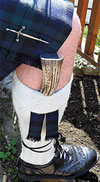
I discovered today that dolch is the German equivalent of dirk, the dagger that is worn in the sock in Scottish Highland dress (see photo). The dirk is known as a sgian dubh (black knife or secret knife) in Scottish Gaelic, and the word dirk, which first appeared in English as dork in the 17th century, possibly comes from the German word dolch (dagger) or dolk, which is found in Dutch, Danish and Swedish [source].
Another German word for knife is Messer, which comes from the Old High German mezzeres/mezzirahs/mezzisahs (knife), from the Proto-Germanic *matisahsą (knife), from *matiz (food) and *sahsą (knife, dagger). Messer is cognate with the Old Saxon metisahs/mezas (knife), the West Frisian mês, the Dutch mes (knife), and the Old English word meteseax (knife). [source].
The Old English word seax (knife, short sword, dagger), which appears in meteseax, shares the same root – the Proto-Indo-European *sek- (to cut) – with the Middle English sax (knife); the Danish and Swedish word sax (a pair of scissors), the Icelandic sax (a short heavy sword), and the Latin word secō (cut), as well as the English words Saxon and saw [source].
The English word mess (in the military sense of a dining hall or people who eat together) comes from a different root – from the Latin mittere (to put, place) via the Old French mets (food) [source].